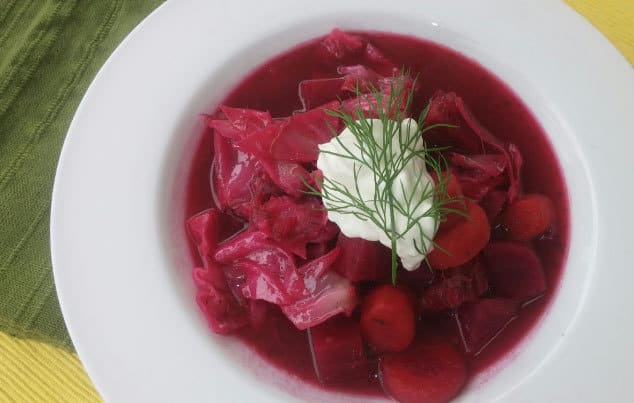As we transition from the Indian summer days of September to the crisp autumnal days of October, I start to feel a strong hankering for comforting food. Nothing quite satisfies on a cool, blustery fall day like a bowl of piping hot soup.
Most gastronomic historians will agree that the lineage of borscht (or borsch, depending on whom you ask) can be traced back to the Ukraine. But if you make that claim to a Russian, you might get slapped for your blasphemy! In truth, there are many different regional takes on the dish, including Polish and Lithuanian versions. Borscht can be made with beef, bacon, or no meat at all. Carrots or potatoes, shredded or chunky—whatever the recipe, whatever the origins, one thing every borscht has in common is the lowly beet.
The humble beet is available all year round. You can toss it in a summer salad or roast it with other root vegetables for a comforting winter dish. They’re also high in vitamins and minerals—particularly the vitamin folate, which is crucial to human growth. These nutritious specimens have been used for centuries for many medicinal purposes, including detoxifying the liver and blood, lowering blood pressure, and decreasing inflammation.
The following borscht recipe is prepared with cabbage and slow-cooked beef broth, making for one big steaming bowl of nutrition, vitality, and love. It’s a dish that’s sure to warm you to your bones at the start of the season.
Chunky Beef Borscht
While the optional marrow bone adds silkiness and nutrients to the broth, it’s not mandatory. You’ll still get many benefits from the bones on the ribs. As with most slow-cooked dishes, this soup only gets better with time. I suggest starting the beef broth first thing in the morning and then making the soup for that night’s dinner. If you make extra, you’ll be sure to have enough borscht for the following day or two. That’s when the flavors really sing.
Prep time: 30 minutes
Cook time: 5 hours
Serves 8
Ingredients
Beef Broth:
- 3 lbs. beef short ribs
- Salt
- 2 tablespoons beef tallow or other fat
- 1 beef marrow bone (optional)
- 1 large onion, roughly chopped
- 2 stalks celery, roughly chopped
- 4 quarts cold water, beef stock, or poultry stock
- 2 bay leaves
- 1 tablespoon red wine vinegar
Borscht:
- 2 tablespoons butter, tallow, or other fat
- 1 large onion, chopped
- 2 carrots, sliced
- 1 large potato, diced into ½-inch pieces (optional)
- 10 medium beets, peeled and diced into ½-inch pieces
- 1 tablespoon dried dill
- 6 cups sliced green cabbage
- 2 tablespoons (or more) red wine or apple cider vinegar
- Salt and black pepper to taste
- Sour cream, for garnish
Instructions
- Prepare broth: Season short ribs liberally with salt. Heat beef tallow in a large, heavy bottomed pot. Sear short ribs on all sides until deeply browned. Transfer to a bowl and set aside. If using the marrow bone, sear it in the fat until browned, then transfer to the bowl with ribs.
- Add onions and celery. Cook until golden. Return short ribs and marrow bone to pot. Add stock or cold water, bay leaves, and red wine vinegar.
- Bring the broth to a boil, then reduce heat and simmer, partially covered, until meat is very tender, about 3½–4 hours, or longer if necessary. If the broth is reducing too much, add more water. Once meat is tender, transfer ribs to a big bowl and strain the broth. Set aside.
- Prepare soup: In another pot, heat butter or tallow until hot. Add onions, carrots, potato (if desired), and beets. Sauté until onions are translucent, then add dill. Pour in the beef broth to cover.
- Bring to a boil, then reduce heat and simmer until all the vegetables are tender, about 30–40 minutes.
Add cabbage and cook until tender. Return beef to pot. Add vinegar, salt, and pepper, adjusting vinegar to your taste. Serve hot, with a dollop of sour cream.
AUTHOR’S NOTE
To choose your organically grown and fresh ingredients wisely, use the following criteria:
- chemical- and hormone-free meat
- wild-caught fish
- pasture-raised, organic eggs
- whole, unrefined grains
- virgin, unrefined, first-press organic oils
- whole-food, unrefined sweeteners
- pure, clean, spring water
- sea salt
- raw and/or cultured milk and cream products


